 |
Post-Keynesian Economics Selected Essays on Pricing, Money and Growth
London: Routledge
This comprehensive collection brings together sixteen influential papers by Marc Lavoie that showcase the depth and breadth of post-Keynesian economic thought. Organized into four thematic sections, this volume offers critical insights into theoretical foundations, pricing mechanisms, monetary systems, and growth models that challenge mainstream economic paradigms.
Beginning with foundational explorations of Post-Keynesianism and its relationship with Neo-Ricardianism, the collection traces the evolution of this heterodox school of thought and examines its development in different contexts, including its remarkable journey in Canada. The second section delves into the nuanced world of post-Keynesian pricing theory, examining mark-up pricing versus normal cost approaches and engaging with the influential work of Frederic Lee. The monetary section—the most extensive in the collection—addresses critical issues from endogenous credit-money theory to modern monetary theory (MMT), offering penetrating analyses of reserve systems, sovereign currencies, and inflation dynamics through a post-Keynesian lens. The final section revisits the author’s seminal contributions on growth and distribution models, exploring the reconciliation of Kaleckian and Sraffian approaches and examining innovative concepts like cadrisme and overhead labor costs.
This essential volume not only preserves important theoretical contributions but also demonstrates the continuing relevance of post-Keynesian economics in addressing contemporary economic challenges. Scholars, students, and policymakers will find this collection an invaluable resource for understanding alternative approaches to economic theory and policy.
The chapters in this volume were originally published in Review of Political Economy and are now presented with a new Introduction and Foreword.
|
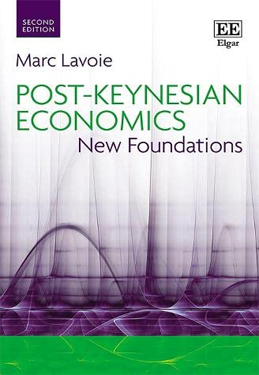 |
Post-keynesian Economics: New Foundations – Second Edition
Cheltenham, UK and Northampton, MA: Edward Elgar Publishing
The book is a considerably revised and updated version of the widely used and frequently cited 2014 edition, which won the EAEPE Myrdal Prize (now the Joan Robinson Prize).
It provides an exhaustive account of post-Keynesian theory and policy. Topics covered include its methodological foundations, consumer theory and choice under fundamental uncertainty, firms and pricing, money and credit, effective demand and employment, growth theory, open-economy issues, inflation theory.
It also links up with ecological economics.
Scholars of economics, particularly post-Keynesian and heterodox economists, will find this comprehensive look at the field a necessary addition to their libraries and students and instructors will find it a perfect text for any class on post-Keynesian economics.
|
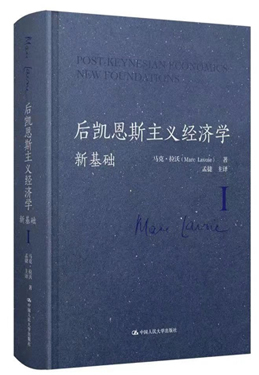 |
Post-Keynesian Economics: New Foundations – Chinese edition
2021 Chinese translation of the book Post-Keynesian Economics (2014), organized by Jie Meng and Hui Yuan, in two volumes.
The book is a considerably extended and fully revamped edition of the highly successful and frequently cited Foundations of Post-Keynesian Economic Analysis. It provides an exhaustive account of post-Keynesian economics and of the developments that have occurred in post-Keynesian theory and in the world economy over the last twenty years. Topics covered include open-economy issues, the methodological foundations of heterodox economics, consumer theory, firms and pricing, money and credit, effective demand and employment, inflation theory, and growth theories.
|
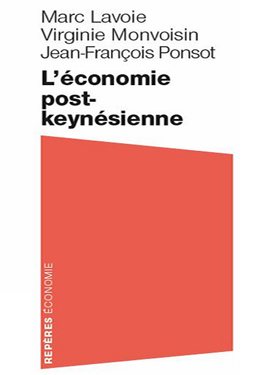 |
L’économie post-keynésienne (2021)
Paris: La Découverte (Repères)
L’économie post-keynésienne fournit une grille d’analyse économique alternative. Plus qu’un simple prolongement de la pensée de John Maynard Keynes, elle contribue au renouvellement actuel de la pensée économique et des politiques économiques.
Cet ouvrage vise à présenter de manière claire et synthétique les fondements, développements et résultats post-keynésiens. Après la présentation de l’hétérodoxie post-keynésienne, il souligne l’importance des mécanismes monétaires, leurs liens avec la dynamique macroéconomique, puis traite de l’analyse de court terme (microéconomie, demande effective et marché du travail) et de celle de long terme (croissance). Il s’adresse aux étudiants désireux de découvrir l’économie post-keynésienne et ses modèles récents, comme la théorie monétaire moderne. Au-delà, il intéressera toute personne à la recherche d’éléments d’analyse permettant de mieux comprendre les défis majeurs de notre époque.
|
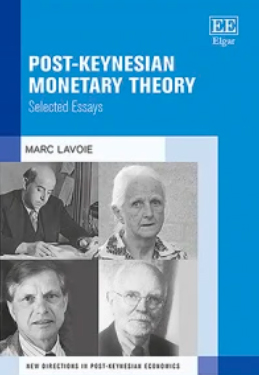 |
Post-Keynesian Monetary Theory: Selected Essays (2020)
Cheltenham, UK and Northampton, MA: Edward Elgar Publishing
Post-Keynesian Monetary Theory recaps Marc Lavoie’s views on monetary theory over a 35-year period, seen from a post-Keynesian perspective. The book contains a collection of twenty previously published papers, as well as an introduction which explains how these papers came about and how they were received. All of the selected articles avoid mathematical formalism.
Readers will find analyses of the earlier advocates of endogenous money such as Nicholas Kaldor and Jacques Le Bourva. They will discover how the arguments in support of the post-Keynesian theory of endogenous money and the credit view of banking have evolved through this 35-year period, and how they have been related to the new procedures pursued by central banks. All these essays show the relevance of the realistic post-Keynesian monetary theory in understanding the subprime and euro crises, quantitative easing and the distributional role of interest rates. Within these pages Marc Lavoie provides an overview of what has happened in post-Keynesian monetary economics over the last three and a half decades for students and scholars with interest in monetary economics, the horizontalist-structuralist debates and the recent history of economic thought.
|
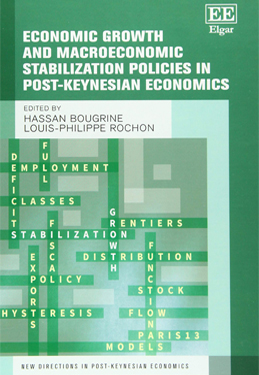 |
Economic Growth and Macroeconomic Stabilization Policies in Post-Keynesian Economics (2020)
Cheltenham, UK and Northampton, MA: Edward Elgar Publishing
Hassan Bougrine, Louis-Philippe Rochon and the expert contributors to this book explore issues of economic growth and full employment; presenting a clear explanation to stagnation, recessions and crises, including the latest Global Financial Crisis of 2007-8. With a central focus on the role played by government spending, deficits and debt as well as the setting of interest rates, the chapters propose alternative policies that can be used by central banks and fiscal authorities to deal with problems of income inequality, unemployment and slow productivity.
|
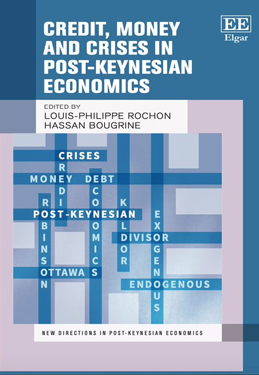 |
Credit, Money and Crises in Post-Keynesian Economics (2020)
Cheltenham, UK and Northampton, MA: Edward Elgar Publishing
In this volume, Louis-Philippe Rochon and Hassan Bougrine bring together key post-Keynesian voices in an effort to push the boundaries of our understanding of banks, central banking, monetary policy and endogenous money. Issues such as interest rates, income distribution, stagnation and crises – both theoretical and empirical – are woven together and analysed by the many contributors to shed new light on them. The result is an alternative analysis of contemporary monetary economies, and the policies that are so needed to address the problems of today.
|
|
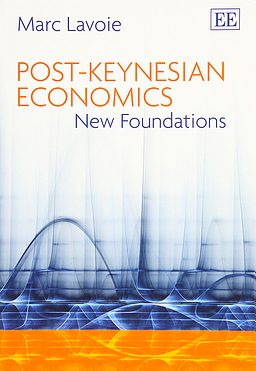
|
Post-Keynesian Economics: New Foundations (2014)
Cheltenham, UK and Northampton, MA: Edward Elgar Publishing
The book is a considerably extended and fully revamped edition of the highly successful and frequently cited Foundations of Post-Keynesian Economic Analysis, published in 1992. It provides an exhaustive account of post-Keynesian economics and of the developments that have occurred in post-Keynesian theory and in the world economy over the last twenty years. Topics covered include open-economy issues, the methodological foundations of heterodox economics, consumer theory, firms and pricing, money and credit, effective demand and employment, inflation theory, and growth theories.
|
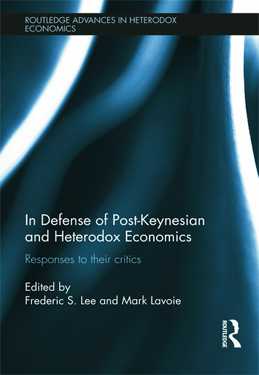 |
In Defense of Post-Keynesian Economics and Heterodox Economics: Response to their Critics (2013)
London: Routledge
Post-Keynesian and heterodox economics challenge the mainstream economics theories that dominate the teaching at universities and government economic policies. And it was these latter theories that helped to cause the great depression the United States and the rest of the world is in. However, most economists and the top 1% do not want mainstream theories challenged—for to do so would mean questioning why and how the 1% got where they are. Therefore, numerous efforts have been and are being made to discredit if not suppress Post-Keynesian and heterodox economics. These efforts have had some success; this book is a response to them.
This book makes it clear that Post Keynesian/heterodox economics is, in spite of internal problems, a viable and important approach to economics and that it should resist the attempts of the critics to bury it. The reader will also find arguments that directly engage the critics and suggest that their views/criticisms are vacuous and wrong. As such, this will appeal to all who are interested in economic theory, economic history and who believe in challenging the orthodoxy.
|
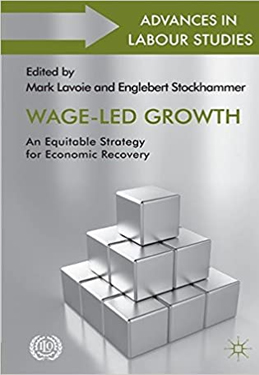 |
Wage-Led Growth: An Equitable Strategy for Economic Recovery (2013)
Basingstoke, UK: Palgrave Macmillan and International Labour Office
This original and extensive study examines the causes and consequences associated with the falling wage share and rising inequality in income distribution, relating to both aggregate demand and labour productivity. It presents new empirical and econometric evidence regarding the economic causes and potential impact of changing income distribution.
|
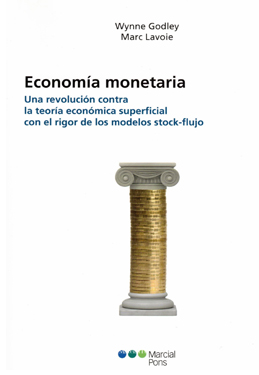 |
Economía monetaria: una revolución contra la teoría económica superficial con el rigor de los modelos stock-flujo (2012)
Madrid: Marcial Pons
Economía monetaria es la traducción de la obra maestra de los economistas Wynne Godley y Marc Lavoie, Monetary Economics. En realidad, no sólo es una traducción, es una edición resumida y arreglada dedicada fundamentalmente a estudiantes de licenciatura y de posgrado. En ella, se explica la importancia de los principios contables de la economía y, a través de una serie de modelos de dificultad creciente, se enseña al estudiante a dominar dichos principios y a cómo mejorar su entendimiento de cómo funcionan las economías reales. El libro es un desafío a la teoría económica que normalmente se enseña, y constituye una alternativa para aquellos que busquen explicaciones y soluciones para la gran crisis económica actual.
|
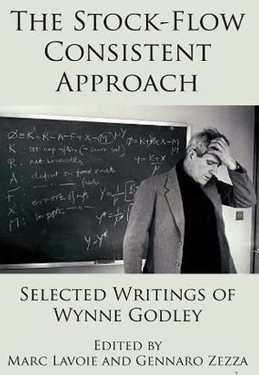 |
The Stock-Flow Consistent Approach: Selected Writings of Wynne Godley (2012)
Basingstoke, UK: Palgrave Macmillan
Selected essays from the eminent economist, Wynne Godley, tracing the development of his work and illuminating the key theories and models that made his name. Essays focus not only on the stock-flow coherent approach, but also lay out Godley’s views about the European Union and the stability of its monetary policy.
|
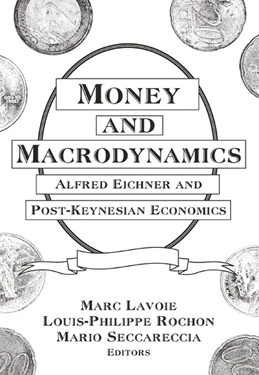 |
Money and Macroeconomic Issues: Alfred Eichner and Post-Keynesian Economics (2010)
Armonk, NJ: M.E. Sharpe
Alfred Eichner’s pioneering contributions to post-Keynesian econmics offered significant insights on the way modern economies and institutions actually work. Published in 1987, his « Macrodynamics of Advanced Market Economies » contains rich chapters on dynamics and growth, investment, finance and income distribution, a timely chapter on the State and fiscal policy, and two analytical chapters on endogenous money that are years ahead of their time. Featuring chapters by many of Eichner’s disciples, this book celebrates his rich contributions to post-Keynesian economics, and demonstrates that his work is in many ways as valid today as it was over two decades ago.
|
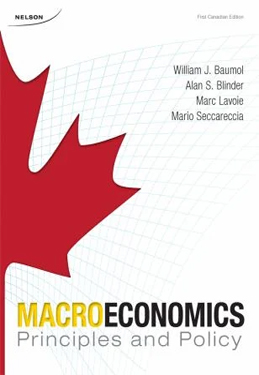 |
Macroeconomics: Principles and Policy (2009)
Toronto: Nelson Education
In this compelling first Canadian edition of Macroeconomics: Principles and Policy, the authors maintain the emphasis on policy issues and on the institutional features of the economy, but set them in a Canadian context. Through this emphasis, you will better understand how the economic system actually works.
|
 |
Microeconomics: Principles and Policy (2009)
Toronto: Nelson Education
Microeconomics: Principles and Policy brings to the Canadian market a strong text that is already widely known and well respected in the U.S. market. The text achieves the right level of rigor and detail, presenting complicated concepts in a relatively straightforward manner and using timely economic data. Puzzles, issues, and well-developed examples provide a good balance of theory to application.
|
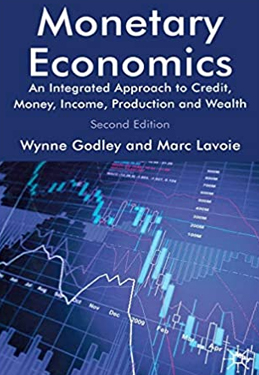 |
Monetary Economics: An Integrated Approach to Credit, Money, Income, Production and Wealth (2007)
Basingstoke, UK: Palgrave Macmillan
This book challenges the mainstream paradigm, based on the inter-temporal optimisation of welfare by individual agents. It introduces a methodology for studying how institutions create flows of income, expenditure and production together with stocks of assets and liabilities, thereby determining how whole economies evolve through time.
|
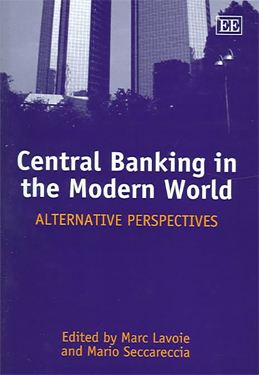 |
Central Banking in the Modern World: Alternative Perspectives (2004)
Cheltenham, UK and Northampton, MA: Edward Elgar Publishing
According to the New Consensus in monetary economics, monetarism is dead and central bankers target low inflation rates by acting upon short-term real rates of interest. Yet, this synthesis hinges on variants of the long-run vertical Phillips curve originally proposed by Milton Friedman, the father of old-line monetarism. Contributors to this volume question this New Consensus. While they agree that the money supply should be conceived as endogenous, they carefully examine the procedures pursued by central banks, the monetary policy transmission mechanisms suggested by central bankers themselves, and the assumptions imbedded in the New Consensus. They propose alternative analyses that clearly demonstrate the limits of modern central banking and point to the possible instability of monetary economies.
|
 |
Introduction to Post-Keynesian Economics (2006)
Basingstoke, UK: Palgrave Macmillan
This book offers an accessible introduction to post-Keynesian economics, showing that there is an alternative to neoclassical economics and its free-market economic policies. Post-Keynesian economics is founded on realistic assumptions, such as interest targeting by central banks or constant average variable costs in manufacturing and services
|
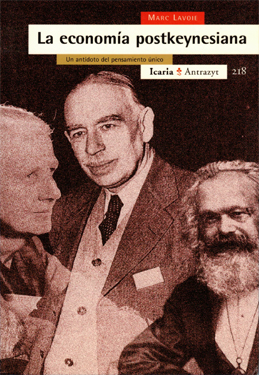 |
La economía postkeynesiana: Un antídoto del pensamiento único (2005)
Barcelona: Icaria editorial
La economía postkeynesiana supone una alternativa al pensamiento económico dominante. Las teorías macroeconómicas que se deducen de las hipótesis más realistas de los postkeynesianos tienen como consecuencia unas políticas económicas radicalmente diferentes a las que se inspiran en los postulados neoclásicos habituales: un crecimiento de la demanda no coincide necesariamente con un aumento de precios; el aumento del salario mínimo o del salario real no provoca el aumento del paro; este mismo incremento del salario real no conlleva, fatalmente, el descenso de la tasa de beneficio de las empresas; el descenso de los índices de ahorro no desencadena la caída de la inversión, la ralentización del crecimiento o el incremento de las tasas de interés; la flexibilidad de los precios no conduce necesariamente a la economía hacia el equilibrio óptimo, etc. Siguiendo a Keynes, los postkeynesianos creen que el capitalismo es un sistema económico eficaz, a condición de que sea controlado mucho más estrictamente que lo que sugiere el pensamiento dominante.
|
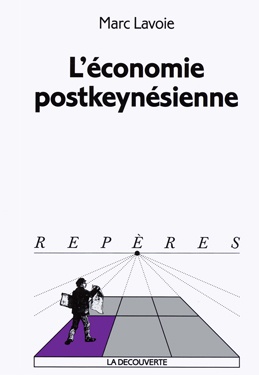 |
L’Économie postkeynésienne (2004)
Paris: La Découverte (Repères)
L’économie postkeynésienne veut être une alternative à la pensée économique dominante. Les théories macroéconomiques qui découlent des hypothèses plus réalistes des postkeynésiens ont des implications de politiques économiques radicalement différentes de celles qui s’inspirent des postulats néoclassiques habituels : un accroissement de la demande n’engendre pas nécessairement la hausse des prix ; la hausse du salaire minimum ou du salaire réel ne provoque pas la hausse du chômage ; cette même hausse du salaire réel n’entraîne pas fatalement la baisse du taux de profit des entreprises ; la baisse des taux d’épargne ne déclenche pas la chute de l’investissement, le ralentissement de la croissance, ou la hausse des taux d’intérêt ; la flexibilité des prix ne ramène pas nécessairement l’économie vers l’équilibre optimum, etc. À l’instar de Keynes, les postkeynésiens croient que le capitalisme est un système économique efficace, à la condition qu’il soit encadré beaucoup plus strictement que ne le suggère la pensée dominante.
|
 |
Désavantage numérique, les francophones dans la LNH (1998)
Hull: Vents d’Ouest
« Ailleurs [qu’au Québec], dans la Ligue nationale, à talent égal, on engagera un anglophone. » Cette déclaration explosive du journaliste sportif, Réjean Tremblay, indique que les francophones sont victimes de discrimination dans la LNH. Pour John Ziegler, de telles affirmations sont « ridicules et absurdes », tandis que pour Maurice Richard, Guy Lafleur, Jean Perron et Ronald Corey, les francophones sont nettement désavantagés et se doivent d’être meilleurs que les autres pour réussir.
À chaque séance de repêchage de la LNH, nombre de gens se demandent pourquoi les joueurs québécois ont encore été oubliés. Y a-t-il de la discrimination au repêchage ? Pourquoi les joueurs francophones de la LNH ont-ils, en moyenne, des performances supérieures à celles des anglophones? Ces francophones sont-ils payés à leur juste valeur? Une enquête explosive qui va à l’encontre de nombreux mythes et d’une multitude de croyances populaires.
|
 |
Avantage numérique, l’argent et la Ligue nationale de hockey (1998)
Hull: Vents d’Ouest
Posséder une franchise de sport professionnel, voilà le rêve de toute grande ville nord-américaine. Est-il vrai qu’une équipe professionnelle représente une mine d’or pour la ville qui l’héberge ? Quel est l’impact de l’augmentation vertigineuse des salaires et de l’adoption de nouvelles conventions collectives ? Y a-t-il un lien entre cela et le départ des équipes de Winnipeg et de Québec pour les Etats-Unis ? Avons-nous perdu notre sport national ? Est-il possible d’acheter un championnat ou une coupe Stanley ? La violence au hockey est-elle payante ou nécessaire ? Les propriétaires d’équipes veulent-ils vraiment gagner ou faire uniquement des profits ? Voici enfin un ouvrage scientifique sur le sujet. Ce volume offre un ensemble de données qui permettent une analyse sérieuse et fondée de l’économie de la LNH. Un livre brûlant d’actualité!
|
 |
Milton Friedman et son oeuvre (1993)
Montréal: Presses de l’Université de Montréal
Qu’on le tienne pour l’Adam Smith de notre siècle ou, au contraire, pour le Lyssenko de l’économique, personne ne peut rester indifférent à Milton Friedman. Prix Nobel de sciences économiques en 1976, Friedman a laissé sa marque dans plusieurs domaines de la théorie économique, notamment la théorie monétaire, mais aussi sur la société tout entière. Ce volume cherche à expliquer comment Friedman a exercé une si grande influence sur la science économique contemporaine et sur l’idéologie et les politiques économiques présentes. L’ouvrage comprend les textes d’une douzaine de spécialistes de science économique, de science politique et de méthodologie, provenant d’universités françaises et canadiennes. Il contient aussi une bibliographie complète des œuvres scientifiques de Friedman, ainsi qu’une postface de Milton Friedman lui-même, rédigée expressément pour ce volume, et dans laquelle il explique son cheminement.
En somme, ce livre constitue une référence indispensable, tant pour ceux qui s’inspirent de l’œuvre de Friedman que pour ceux qui font montre de scepticisme à son égard.
|
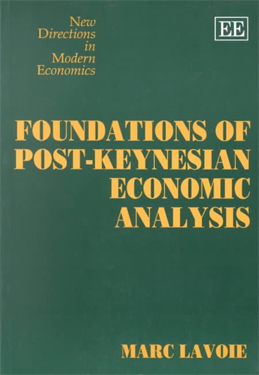 |
Foundations of Post-Keynesian Economic Analysis (1992)
Aldershot, UK and Brookfield, VT: Edward Elgar Publishing
This innovative book demonstrates that it is possible to construct a coherent alternative to neoclassical economics based on the contributions of post-Keynesian and Kaleckian economists. It identifies elements from the non-orthodox traditions, in particular from the neo-Ricardian school, that can be welded into a convincing alternative theoretical framework.
|
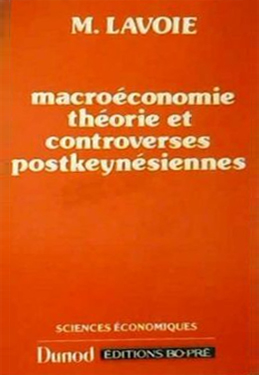 |
Macroéconomie: théorie et controverses postkeynésiennes (1987)
Paris: Dunod
Cet ouvrage montre qu’il existe deux grands paradigmes en macroéconomie, l’approche systémique et l’approche ensembliste, celle-ci souffrant de défauts rédhibitoires. Marc Lavoie en décrit, dans la première partie de son texte, les déficiences logiques, que ce soit dans un cadre stationnaire ou de croissance – ces défauts étant particulièrement visibles lorsque l’économie considérée est véritablement dynamique, c’est-à-dire lorsqu’elle inclut le progrès technique. L’auteur propose alors une alternative, l’approche cambridgienne, accordant une importance prépondérante au cadre institutionnel qui, bien que présenté de façon encore abstraite, est intégré à l’analyse de la croissance. Il peut ainsi traiter du plein emploi, de l’Etat, des classes sociales, de la rémunération de l’épargne, de l’entreprise, de son endettement, des marchés financiers et de la monnaie.
|